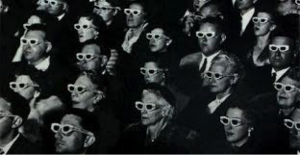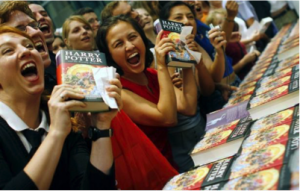by Stephanie Larkin
Given that we have explored the issues surrounding the legal, moral and economic aspects of content creation and copyright it seems only fitting that we include an area that looks into where fans and consumers might fit into the picture. What role do they play in the copyright discussion? And where exactly does their content lie within the scheme of things?
In this area of our examination of copyright I aim to investigate these questions through looking into the relationship between consumer and fan related content with that of the producers of the original material that that inspired the fan material. I will explore the differences between what can be considered a parody and when something might breach copyright, and from the aspect of a fan, consider how one might go about creating non-questionable content. I will be looking into a few specific examples in order to justify and expand on arguments and will be concluding by considering how, unsurprisingly, the issue can be distilled by looking into the Fan VS Fan conflicts around the subject of content ownership.
Fans and Harry Potter
In researching I have come across many significant examples related to fan and producer related battles over ownership. I have chosen to explore the fan related fiction that exists around the Harry Potter novels and films in more detail. The Harry Potter franchise has strong emotional connections with many young adults who are well placed to take advantage of online community forums and creation. This makes it a rich arena to explore when it comes to fan fiction and copyright. The author, J.K. Rowling, has a strong and somewhat unique relationship with her fans and their content. Although she does not approve of her content being reused and adapted for commercial purposes, she is supportive of a lot of her fan fiction, reading and interacting where she feels appropriate (Schwabach, 2011, p.117). Warner Brother’s has a different position on the issues of IP going to such lengths as taking on innocent 15 year old bloggers in order to protect their ownership of the films (Schwabach, 2011, p118).
Today, consumers have great potential to interact with authors and creators of their favourite works through the platform of fan fiction. The Harry Potter fandom has one of the biggest communities in existence and has grown faster than those such as Star Trek and Star Wars as a result of it existing predominantly after the introduction of the World Wide Web (Schwabach, 2011, p143). Henry Jenkins states, “Poachers do not observe from the distance (be it physical, emotional, or cognitive); they trespass upon others’ property; they grab it and hold onto it; they internalize its meanings and remake these borrowed terms” (Jenkins,1992, p115). Rowling is a great example when it comes to her books as she “not only permitted, but encouraged fan fiction and other fan works” (Schwabach, 2011, p144) and in doing so can be considered to have further endorsed her product. She listened to her fans and used them to some extent as inspiration, understanding that, as her audience, there are significant rewards in keeping them satisfied. She even goes as far as to give ultimate praise to her favourite pieces of fan fiction, saying the following about the site The Harry Potter Lexicon:
This is such a great site that I have been known to sneak into an internet café while out writing and check a fact rather than go into a bookshop and buy a copy of Harry Potter (which is embarrassing). A website for the dangerously obsessive; my natural home. (Rowling, 2006)
The site is exhaustive on every detail in the Harry Potter universe. Going into the character profiles alone you can find the most specific and intimate details from the exact grades that a Hogwarts student received during each of their exams, to the fine details about the differences that exist between the novels and the films, plus direct quotes from actors regarding their characters. Each profile is multiple pages long. There are also sections including everything you need to know about spells, muggles and potions, just to name a few. This is fan fiction taken to another length with the fans to some extent probably more familiar with the content than the author. Although it may be a clear replication of Rowling’s content, it can also be considered a valuable resource, acting as an informative catalogued site. The owner, Steve Vander Arc, is not selling his product and has in fact gone to the length of copywriting his own work, ensuring to give reference where applicable in order to avoid getting caught up in copyright legislation. Despite not all fan sites being as developed and professional as this one, unnecessary copyright measures can hinder the spread of niche information such as this.
Warner Brothers does not share J.K. Rowling’s acceptance of fan content when it comes to the rights of the Harry Potter film brand and has been militant with legal action in the past. It must be noted that when film copyright becomes involved there is another layer of complexity added between the author and the fans, as a result the tolerance regarding copyright legislation can tend to diminish (Schwabach, 2011, p118). An example of specific actions by the company include their many attempts to shut down non-commercial fan sites produced in most cases by teenagers for the use of images and site names that Warner Brothers lawyers claim breach legislation. These actions can be seen as somewhat naive as they show misunderstanding of the actuality that sites such as the ones they are targeting provide marketing in a form more valuable than anything they could ever buy (Schwabach, 2006, p390). Despite their actions, however, there has been no extreme effort by Warner Brothers to put an end to the fanfic once and for all. This indicates that over time they have become aware of the advantages of relaxing the laws in certain circumstances, yet they maintain power and avoid weakness through their handful of allegations to a collection of fans.
Copyright or Parody?
Harry Potter is also an example that brings into question the idea of what can be considered a parody. Parody is defined as “an imitation of the style of a particular writer, artist, or genre with deliberate exaggeration for comic effect”, but how far can this definition stretch? We have to consider the differences between where the content been mimicked and where it has it be simply adapted and added to. This is an area in which there is no clear definition. In the case of Harry Potter there is a specific “parody” where both J.K. Rowling and Warner Brother’s can agree on the adaptation of the content crossing the line (Schwabach 2011, p119); this being in the case of Russian author, Dmitri Yemets’ novel, Tanya Grotter. In the adaptation Tanya “rides a double bass, sports a mole instead of a bolt of lightening, and attends the Tibidokhs School of Magic.” Yemets describes her as “cultural competition and “the Russian answer to Harry Potter”, whereas Rowling labels her a copyright infringement (Schwabach, 2011, p120).
These commercially produced adaptations are appropriately given far less leniency than other non-commercial fan work as they take advantage of a brand and its stakeholders. Rowling filed a lawsuit against the distribution of the Tanya Grotter books in the Netherlands and won with the court finding the adaptation of the books to be in competition with, rather than a parody of the Harry Potter series. It is also interesting to note, Rowling’s efforts to suppress the books generated more interest and publicity (Schwabach, 2011, p119). This case reinforces the fact that there is a fine line between what might be accepted and what is an infringement of copyright as, ultimately; Yemets has succeeded in profiting off content that is questionable in respect to copyright. It almost suggests that there is an aspect of chance involved when it comes to parodies, as it is inevitably the interpretation of a significant individual, Rowling in this case, that dictates the acceptability of the content. It is suggested that in order to create a successful parody there is a need to take an idea and add extensive relatable, but at the same time, entirely new material to it in order to justify its originality. Perhaps the key here is adding more than what you take/adapt.
A new form of communication has emerged on the web in recent times, in the form of memes, vines, instagrams and various others. They have been used to create their own new expression by, a lot of the time, adapting someone else’s content. Whether their motives can be considered parody or in breach of copyright, they are for the most part a fun way of identifying with one another, through a medium in which those communicating are already familiar. They are basically a fun shortcut used in order to portray a particular message. Phillipa McGuinness suggests that, “Perhaps we need an exception to copyright infringement, one that supports and encourages our cultural creation and development: a defence of homage” (2015, p168). This ‘meme language’ might just fit into this exception. In most cases a blind eye is turned towards any sort of violation being caused in the case of these examples, but there is potential and cause for there to be. We all hear about the silly copyright battles that occur, and perhaps taking this idea into consideration might help prevent time and money being wasted in legal disputes and creativity being tarnished in the future.
Fan VS Fan
When fans begin to take on fans in relation to the copyright of the produced fan fiction itself; things can get complicated. Whether it is huge sums of money on the line or simply the recognition of an individual, there are always going to be battles over ownership. With so much content in existence it is almost impossible to have a completely original idea (Bannerman, 2015). With this content being so accessible in our time the arguments can somewhat inevitably be considered never-ending. This is where discussion of fan VS fan related content becomes relevant, as the deliberations that are present at this deeper level illuminate how complex copyright battles can become when fans are involved on both sides.
To explain in a little more depth, the term ‘fan VS fan’ refers to a situation where a fan attempts to or allegedly copies another fan’s work of fan fiction. Although, this is somewhat a bizarre thing to comprehend alone, the legal aspects that surround an allegation in relation to an event like this are even more surprising and generally a little confusing. This is to say if the initial fan fiction is itself an unlawful use of the underlying work, it is effectively an infringement of copyright already. Any replication of the fan work, although immoral, is not illegal in respect to the author of this material but is in breach of copyright surrounding its original inspiration. There may be no obvious legal consequences to the reproduction of a fan’s work but within the fandom world there are still social impacts that can be considered. Like in many areas of the Internet that involve sharing and collaboration, there is a social status to be gained when it comes to the producers of fan fiction. Naturally where there is something to be gained, there is also something to be lost, and the immoral reuse of another’s work is something that might not result in legal action but could definitely end in a ferocious online war.
In exploring this next level aspect surrounding fans and copyright, the complexity of the topic becomes more exposed. It can be assumed that measures of controlling plagiarism are never going to be able to keep up with the production of content and the ease of publishing it and therefore there must be a certain amount of leniency. Individuals battling over what is effectively already copyrighted work can show that fan culture is an important part of any brand.
Conclusion
Copyright is a complex area to explore, especially when fan culture is involved. Although it is important to protect the integrity of an author’s work, as they way people interact with content changes, the concept of originality is becoming one that is somewhat difficult to grasp. In many circumstances content that might happen to breach copyright is completely innocent, merely providing a source of entertainment and discussion on the most accessible platform in today’s age, the Internet. This particular content can serve as aid to the content creator, as admitted by J.K Rowling, or simply just allow a fan a means of becoming a part of the world they are so engrossed in. Legislation is always going to be a necessary part of fan fiction and copyright, but in many cases it is something that should almost be carefully assessed depending on the circumstances. Fans, and the material which they produce, are essential to the success of any production and their contribution provides a free and effective form of continual marketing and content generation. Fan fiction can be mutually beneficial for all parties involved if the correct balance is found.



